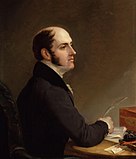1833 Speaker of the British House of Commons election
| |||||||||||||||||||
| |||||||||||||||||||
| |||||||||||||||||||
The 1833 election of the Speaker of the House of Commons occurred on 29 January 1833.[1]
This was the first Parliament after the Reform Act 1832. Not wishing to have an inexperienced Speaker preside over the reformed Parliament, the government persuaded the long-serving incumbent Speaker Charles Manners-Sutton to postpone his retirement.[2] He was standing for a seventh term as Speaker.
Joseph Hume (Radical) objected that Manners-Sutton, a vocal opponent of the reform, should not preside over a reformed Parliament. He proposed Edward Littleton (Whig). Daniel O'Connell (Irish Nationalist) seconded.
Viscount Morpeth, although a Whig, commended Manners-Sutton's conduct as Speaker, and proposed him. Sir Francis Burdett (Radical) seconded.
A debate ensued. Littleton spoke against his own nomination, stating his support for Manners-Sutton and asking that Manners-Sutton be elected without a division.
O'Connell objected to this: he would not countenance a Tory Speaker after the reform, believing that "the grand advantage of the Reform Bill was to put down Toryism in England — that vile and abominable system, which existed by the plunder of the people, and by the usurpation of their rights".
Among other objections to Manners-Sutton was the pension awarded on the basis that he was retiring: if re-elected he might draw both a pension and a salary.
Voting on Hume's motion that Littleton take the Chair, the motion was defeated by 31 votes to 241, a majority of 210. The amended motion that Manners-Sutton take the Chair was then passed without division.[1]
The elections of 1833 and 1835 (in which Manners-Sutton was defeated) were the only elections since 1780 in which an incumbent Speaker seeking re-election was opposed.
References[edit]
- ^ a b "Choice of a Speaker". Parliamentary Debates (Hansard). Vol. 15. House of Commons. 29 January 1833. col. 35–83.
- ^ Barker, G. F. R. (1893). . In Lee, Sidney (ed.). Dictionary of National Biography. Vol. 36. London: Smith, Elder & Co.


